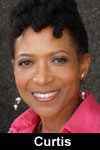Mary C. Curtis: Still Fighting
Posted at 8:49 am, March 20th, 2009
In the photograph, lawyer Julius Chambers stands in the rubble of his fire-bombed office. His firm is in the middle of more than 30 desegregation lawsuits before courts in North Carolina. And the Swann v. Charlotte-Mecklenburg schools case – which would be a landmark win for school desegregation and the law firm – is pending in the U.S. Supreme Court. They also bombed Chambers’s car and home. The “they”? Anonymous cowards resistant to change, in this case and many others of the time.
It’s Charlotte, N.C., in February 1971.
Fast-forward to March 2009.
The firm of Ferguson, Stein, Chambers, Gresham and Sumter – which had its start more than 40 years ago as one of the first integrated law firms in the South – is still in the middle of important civil rights and criminal justice cases. It is also being honored with an award from the Echo Foundation in a hotel ballroom packed with people of every race.
The Echo foundation was created in 1997, with inspiration and guidance from Nobel laureate Elie Wiesel after his visit to Charlotte. Echo’s mission: “to sponsor and facilitate those voices that speak of human dignity, justice and moral courage in a way that leads to positive action for humankind.” The foundation brings speakers to Charlotte-area students, and sends the students on missions to countries such as Rwanda, where a group worked with Partners in Health (PIH).
The founder of PIH, Dr. Paul Farmer, known for his international research and advocacy work, spoke at the event to honor the work of Ferguson, Stein, Chambers, Gresham and Sumter. Farmer made the connection between “global inequality and local inequality.”
“The fight against indifference is an everyday fight,” Farmer said. “The discriminations are just more sophisticated now.”
When members of “the firm,” as it is simply called, stood to accept their honor, they were quick to acknowledge that their life’s work is and was “a family enterprise,” James Ferguson said. Spouses and children shared in the risks as well as the rewards.
And the work is not over.
“It’s just started,” said Chambers, citing inequalities that still exist in schools, employment and housing. He did pause to appreciate the election of an African American president and the fact that his work might have had something to do with it.
“We have paved the way for him and others.”




